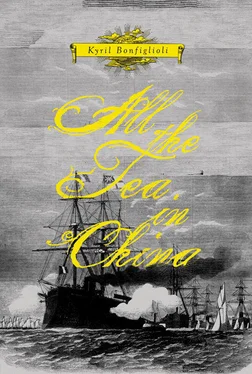At some time soon after the Gran Canaria — I am not certain when, for I was preoccupied with certain formidable headaches I had acquired there, as well as the slight infestation (which the excellent mercury soap which Peter had urged me to buy proved sovereign for) — at some time after quitting this island, I say, we fell in with the Trade Winds, which enabled our Captain to set every scrap of sail and run south and a little east at a rate which pleased everyone on board who knew about these matters.
Porpoises, dolphins and other engaging monsters of the deep played about the ship, as though welcoming us to these latitudes, and flying-fish continually threw themselves upon the deck as willing sacrifices to the Doctor’s skillet. (They are also very good baked.)
The men were happy for, with three strong watches, there was little work: an occasional trimming of the sails and snubbing of the bowlines and, apart from that, a little painting and, of course, the continual burnishing of the bright brass-work.
The officers were happy because the men were happy and there was no wary eye to be kept upon them.
The Captain was happy because we were making wonderfully fast days’ runs southward, which seemed to be what his God wanted of him.
I was happy, in a way, because as the weather grew warmer Blanche chose to don ever more diaphanous and revealing garments although, in another way, I was miserable, for I had long been used to the solaces which the other sex affords and there was no opportunity to work my will upon Blanche — although there was no doubt in my mind that I would, sooner or later, do so. Indeed, each day my imaginative fervour became more inflamed and each night I imagined an even more vigorous consummation between us when the time should be ripe.
I read a great deal in Jane Austen and some of Peter’s heathen authors; I found one of the latter much to my taste, a poet, Catullus, who wrote a Latin that I could construe without great difficulty. One of his lines, so apt to my feelings towards Blanche, sticks in my mind to this day:
“Odi et amo. Excrucior .” — “I hate her; I love her. It hurts.”
That was not, I suppose, a novel sentiment even in ancient Rome but was expressed with a concision which few writers of our day could rival.
The days, as I have said, passed pleasantly enough and indeed uneventfully except for one diverting moment when we were close to the southernmost point of the Bight of Benin and the lookout man hailed the deck with news of a ship crossing our stern at the distance of a mile. Captain Knatchbull, to my surprise, seized his spy-glass and swarmed up the ratlines like a marmoset. In a moment he was down again, shouting a string of orders. The ship went about, the White Ensign — which we had no right to fly — was run up, powder and shot were broken out and soon a ball from our long brass carronade went screaming across the bows of the long, fast-looking vessel which was now on our starboard quarter. The vessel paid no heed, except to shake out a reef or two of sail; our second ball fell short. Shaken and dazed by the noise and the suddenness of it, I asked Peter what on earth the Captain was about. He gave me a blank, expressionless gaze and I realised that the Captain was within earshot.
“What I am about, Mr Van Cleef,” he said grimly, “is putting the fear of the Lord of Hosts into a vile slaver. Snuff the air, Sir, pray snuff it!” I snuffed. Indeed, even from that distance a loathsome stench was on the breeze.
“Those slaves are fresh from the barracoons,” the Captain rasped on, “in a week they’ll be puddled in their own excrement, and you’d smell the craft from five miles.”
This range was short enough for me; I made polite excuses and strolled as fast as one can stroll to the nearest rail.
“Go to the loo, Mr Van Cleef!” shouted the Captain. I paused, turned, gritting my teeth hard against the bile rising in my stomach.
“The loo , Karli — the loo’ard rail: never spew into the wind!” cried Peter.
Because I was — am — nimble upon my feet I contrived to reach the leeward rail in time and presently understood the seaman-like logic of their advice. (Even now you clever grandchildren smirk — I have seen you — when I use this antiquated sailorman’s word “loo” for what you genteely call the “water-closet”: if you were ever to piddle over the windward side of a ship in the roaring forties I think you might find that old men are not altogether foolish.)
That was the first time I was ever sick on ship-board (except, naturally, after drinking unwholesome liquor in foreign ports) and there was only one other time afterward and that, too, was not caused by the motion of the ship.
When I had quite voided my excellent luncheon into the deep — no one laughed at me; some of the most seasoned of the watch on deck seemed to be almost as revolted as I was — the black, rakish slaver was already almost hull-down, making best speed on the notorious Middle Passage to the West Indies. Quite sixty percent of the slaves, I am assured, will have survived to find interesting and useful work in the Americas and, as I write, I am informed credibly that their descendants are now often taught to read and write and may well, one day, prove to be the equals of their former owners. This seems strange but by no means impossible to one who, like me, has seen strange things in every quarter of the globe. Respice finem , I say, and indeed, experto crede.
We charged on southwards and, although my duties were light, I became as bronzed and weatherbeaten as any shellbacked sailor, for I often went on deck and gazed at my crew-mates sprawled aloft upon the yards, setting or furling sails at heights which would have induced acute vertigo in me. The ship’s people seemed to grumble a great deal when made to scramble up the masts to make these adjustments to the sails — the main course weighed quite one English ton when wet and there were few of the topmen who could boast a full count of finger-nails — but the Second assured me that this grumbling habit of theirs was a natural bent, it made them happy in some curious British way. They were over-fed and under-worked, the First Mate assured me: he was sometimes at his wits’ end to think how to keep them occupied with a fair wind and fine weather. It is easier nowadays in iron ships: there is always rust to be chipped off and steel masts to be scoured with sand and sacking.
Why I refer, from time to time, to “the ship’s people” rather than to “the sailors” is because “sailor” has a precise meaning at sea: it means a before-the-mast man who is making at least his second long passage — on his first he was but a “landsman”. During this, or a later voyage, he might or might not be raised to the degree of “ seaman ”, of which there are two grades. If a man can perform every maritime task imaginable with skill and courage and conceal his crimes from his superiors he may well attain the excellence of being rated an “ordinary seaman”. If he can add to these arts the art of surviving all perils, such as storms, bucko mates, syphilis and “nose-paint” (which means cheap liquor), he may one day reach the distinction of being called “Able-Bodied”. Few achieve this peak and those who do can rarely claim to own an entire able body: they are old and often deficient in fingers, toes, eyes and so forth. The sea is a hard mistress.
So you see that our “ship’s people” comprised landsmen, sailors, seamen, idlers (viz., carpenters, sailmakers and the like), officers, their servants and, sometimes, a supercargo such as I then was.
I cultivated, when I could, the companionship of the horniest-handed of the seamen, for these were great treasure-chests of “yarns” (this word means lovingly-polished lies). They promised me that everything on land had its counterpart in the seas: there was sea-weed, of course, a sea-devil, sea-eagles, sea-girdles, sea-dogs (but not, they assured me, sea — bitches , although I knew better), sea-hogs, sea-lions, sea-jellies, sea-horses and sea-holly, sea-mews and sea-otters, sea-snakes, sea-urchins and, needless to say, the dreaded sea-serpent itself. Every one of them had talked to a man who had seen the sea-serpent; not one claimed to have seen it himself. This disclaimer, universal amongst seafaring men, is an agreed ruse to disarm incredulity, of course.
Читать дальше












